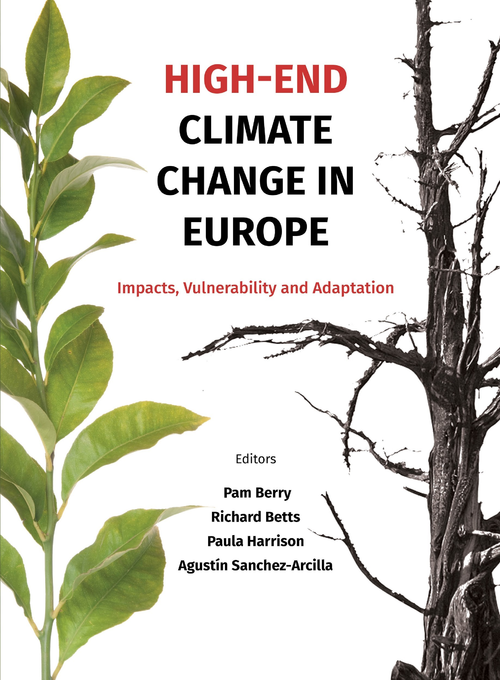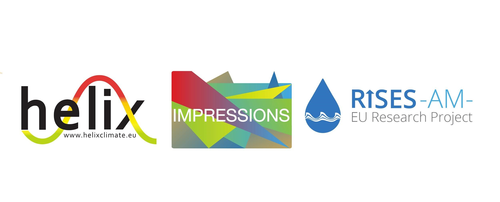Combining the force of over 150 researchers from leading scientific institutions across Europe, three major EU-funded projects, IMPRESSIONS, HELIX and RISES-AM-, have synthesized research knowledge on impacts and adaptation under high-end climate change for key policy sectors.
While the Paris Agreement, adopted in 2015, aims at limiting global warming to well below 2°C, concerns remain that current global greenhouse gas emissions are on track to warm the climate by more than that target. In order to adapt to such high-end climate change and foster actions to avoid it, it is vital that decision-makers have access to reliable scientific information on these uncertain, but potentially high-risk, scenarios of the future.
Funded by the European Union to advance understanding of the consequences of high-end climate change, involving temperature increases above 2°C, IMPRESSIONS, HELIX and RISES-AM-, have assessed climate change impacts, vulnerability and possible adaptation interventions across a range of policy sectors, in order to help decision-makers apply such knowledge within integrated response strategies.
 In the newly published policy booklet they describe research findings and understanding emerging on issues related to high-end climate change alongside reflections on the implications for policy and decision-making. For example, high-end climate change could have strong and lasting effects on the agriculture and consequently on food markets and food security across the globe, and also in Europe. For agriculture, as well as forestry, water and nature conservation differential impacts are projected across Europe and trade-offs may occur between them.
In the newly published policy booklet they describe research findings and understanding emerging on issues related to high-end climate change alongside reflections on the implications for policy and decision-making. For example, high-end climate change could have strong and lasting effects on the agriculture and consequently on food markets and food security across the globe, and also in Europe. For agriculture, as well as forestry, water and nature conservation differential impacts are projected across Europe and trade-offs may occur between them.
Adaptation to high-end climate change, and decisions on actions to avoid it, require robust assessments of the associated risks that go beyond assessing individual impacts of gradual change. As sea level continue to rise, adaptation, including soft engineering and nature-based solutions, will become increasingly important for sustainable coastal management.
Drawing on a very wide range of expertise from many disciplines in both the natural and social sciences, in this booklet the three projects present new understanding of the implications and risks of exceeding 2°C, as well as the challenges and opportunities of adaptation to such a warmer world, and the extent to which risks can be reduced if warming is held as close as possible to 1.5°C. To address these challenges and opportunities, societal transformation and innovative approaches in science and policy may be required.
The booklet features research on impacts and adaptation relevant to a number of areas addressed by policy: food, freshwater, forestry, coastal protection, nature conservation, urban areas, human health and foreign policy. The booklet also considers cross-cutting impacts, challenges and opportunities for transformational change as a response to multiple, interacting risks.
"The policy booklet brings together empirically-grounded science from three large research projects to quantify and explain the consequences of high-end climate change for society at large. The booklet should be particularly useful for decision-makers with responsibility for designing climate change adaptation, mitigation and development strategies by making them fully aware of long-term climate risks, adaptation limits and adaptation/mitigation opportunities" Paula Harrison (IMPRESSIONS Coordinator).
"The policy booklet shows in a single volume the results of three European research projects that illustrate the multiple dimensions of climate change impacts. It also covers new strategies and some innovative solutions for coastal zone adaptation to future scenarios. This can serve to support future climatic assessments that will need to be integrated and incorporate those innovative solutions to increase the sustainability of vulnerable areas such as the coastal zone." Prof. Agustín Sánchez-Arcilla (RISES-AM- Coordinator).
"It's now more important than ever that we get a good picture of high-end climate change above 2 degrees C global warming. What are the impacts and risks? How can we adapt? Is it still avoidable? This report gives a snapshot of current research from three major projects looking at this issue, showing how we are improving our understanding of this crucial global issue." Prof. Richard Betts (HELIX Coordinator).
You can download the booklet from our Media Center.
